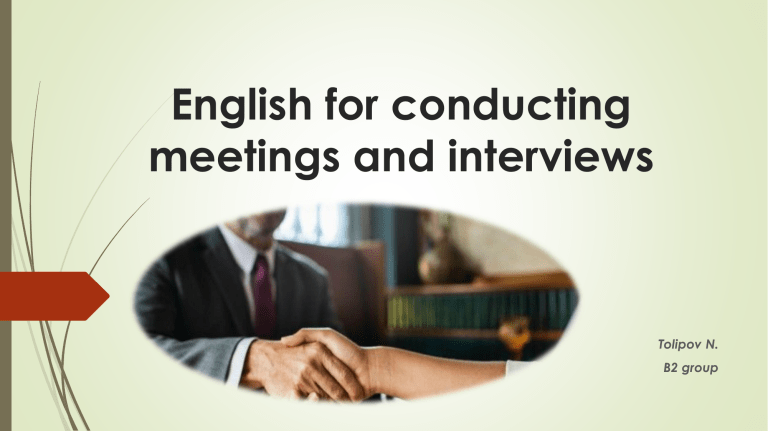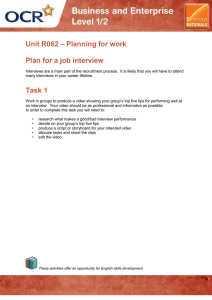
English for conducting meetings and interviews Tolipov N. B2 group Learning Objectives Understand the different types of meeting that can be held and and the objectives that can be achieved through them. Able to run a professional meeting from A to Z. Become more productive and efficient during meetings. Confidently voice your opinion and be heard. Learn different ways to engage your attendees and get them to work together. Deal with difficult situations that arise in meetings. A simple and effective process for looking at information and problems. Apply critical thinking to some real cases and questions we face. Agenda A well-organized meeting will have an agenda – that’s a list of topics that will be discussed. In some meetings, one person keeps notes that will be the official record of the meeting. Why hold a meeting? There are many different reasons. One is to brainstorm. “Brainstorming” is creating a lot of different ideas, so that they can later be analyzed, evaluated, and the best ones can be selected. Brainstorming is often done as a first step in a project, before there is a definite plan. Another reason to hold a meeting is to develop a strategy and allocate tasks. Meetings are also held to collaborate (work together) on projects and give updates – reports of progress and current status. Finally, meetings are held to make decisions. Some meetings use a formal system of voting, in which a decision is made if it receives the majority (more than 50%) of the votes. Other meetings use a less formal system of decision-making, aiming for the group to come to a consensus (a general agreement). Welcoming Phrases Welcome, everyone. Today’s meeting is about… Welcome to today’s meeting. These are the issues that we want to talk about. Welcome, everyone. This is our agenda. Welcome, everyone. The purpose of today’s meeting is… Welcome, everyone. The meeting today is going to last no more than an hour. Welcome, everyone. Thank you all for attending (at such short notice). Interviews Interviews also require special preparation. An interview can accomplish many purposes. It can be used to: gather information deliver information, counsel and motivate, call people to positions, receive reports of stewardships, teach principles and doctrine, determine worthiness. Contact the person. Excuse me, may I ask you something? Hello, this is Maria. I'd like to interview you about your family. Could I please have a few minutes of your time? Are you interested in participating in a interview? Would you mind answering a few questions? Hi! I'm conducting interviews about people's career choices for my class. Could I ask you a few questions? Be prepared. What education and background experience did you need for your career? (general) What do you like and dislike about your career? (general) What advice would you give to someone who wants to pursue this career? (specific) If you could do anything differently in your career, what would it be? (specific)


